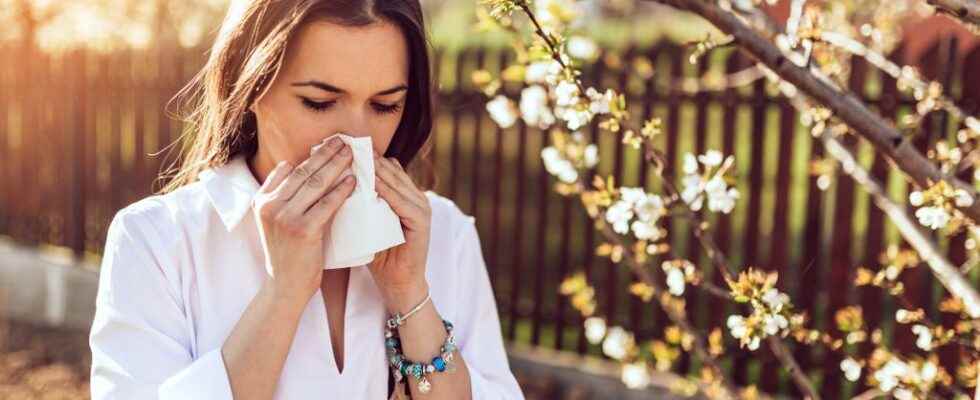The pollens are back. How to tell the difference between a pollen allergy and a Covid-19 infection? In this period of the coronavirus epidemic, the slightest cough becomes suspicious.
Runny nose, cough … symptoms of Covid-19 and pollen allergies are close. Spring is near and pollens are already in the air, as shown in the allergy alert card, updated by the pollen monitoring network (RNSA). As for the coronavirus, a year after its appearance, it is still circulating in France, with an increasing number of contaminations.
How to tell the difference between an allergy and the coronavirus? An allergic flare is characterized by very specific symptoms: rhinitis (a clear discharge from the nose, sneezing, itchy nose), conjunctivitis (weeping eyes, red eyes) and / or allergic asthma (a wheezing, cough).
No headaches, fever, body aches or severe fatigue in case of allergy
On the other hand, with well-controlled allergy, there is no headache, fever, body aches and / or abnormal fatigue – these are symptoms of covid-19. “The other differentiating factor may be the unusual and different character of the cough compared to previous years.“adds the Asthma and Allergies Association on its information site.
The right reflex? In the event of symptoms that can be attributed to the coronavirus (fever, unusual cough, body aches), it is best to call your doctor (general practitioner, pulmonologist, pediatrician) or make a teleconsultation, or even call 15 in case of difficulty breathing.
What is the difference between sudden anosmia (loss of smell) in the event of a Covid-19 infection and the loss of smell in allergic rhinitis? Loss of smell is not specific to Covid-19. When accompanied by a feeling of “stuffy nose”, it is even a common sign of allergic patients. On the other hand, anosmia or ageusia (loss of taste) without nasal obstruction “does not exist in allergy and can therefore mean that we have contracted Covid-19”, specifies the association Asthma and Allergies. If in doubt, contact your doctor.
Warning ! If you suffer from allergic asthma, do not stop your treatment (inhaled corticosteroids): this helps to control bronchial inflammation and limits the risk of complications in the event of coronavirus.
Do pollens promote infection with Covid-19?
According to a recent German study, conducted by the Technical University of Munich, a high incidence rate of Covid-19 is associated with air more concentrated in pollens – including when one is not allergic to it. It is the analysis of data from 31 countries between February and April and 2020, which made it possible to make this statistical association. Specifically, the researchers observed that an increase of 100 pollen particles per cubic meter was equivalent to a 4% higher coronavirus infection rate. According to scientists, the pollens deposited in the nostrils block genes involved in the immune response. Thus the presence in the air of pollens, would make us more vulnerable to infection by Covid.
The same type of association has been observed with air pollution. Indeed, in the latest reports from Public Health France, Covid-19 contamination rates and pollution peaks seem to agree. In both cases, they are observational studies, which does not prove a cause and effect relationship, other factors may also come into play.
Anyway, allergic or not, wearing a mask is more essential than ever.
Source:
- Asthma and Allergies Association
- Higher airborne pollen concentrations correlated with increased SARS-CoV-2 infection rates, as evidenced from 31 countries across the globe, PNAS, March 23, 2021.
Read also :
Subscribe to the Top Santé Newsletter to receive the latest news for free
